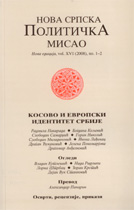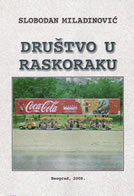| NSPM in English | |||
Contemporary Politics between „Real-Politik“ and Democratic Nationalism |
 |
 |
 |
| уторак, 09. јун 2009. | |
|
Transformations taking place on the scale of world politics, in and through the opening of a new era in international relations - signified by is what most often referred to as the end of US world dominance as a superpower and the beginning of new multilateralism as opposed to its unilateralism of the previous two decades – might actually be bringing with themselves both a new possibility for understanding the political and the changes that will immediately reflect on world political practices. This is to say that not only the movement from “one“ to “many“ in itself has importantly to do with issues such as pluralism and rebirth of democracy both on a large scale and at local levels, but also that an entire ideology of far-right nationalism, most notably manifest in Bush’s administration during which the idea of “US exceptionalism“ was established and supported, is something that will no longer have much to do with politics in the foreseeable future. Ironically, such ideology was both theoretically and practically mixed with simultaneous promotion of an ideology of human rights and wars waged on behalf of “freedom“ and “democracy“, and in this sense tied with what was supposed to be recognized as a leftist or liberal idea of democratic globalization as a new leading trend.
The victory of Barack Obama in the US presidential elections is, therefore, and “always already“ - even regardless of (much) better or (much) worse results that will or will not be achieved in the fields of economy, domestic reforms and international policy – a new beginning and a new chance for politics. The idea here is that the “return of the real“ that is currently taking place not only in the US but also in European, and “Western politics” in general, is played out on both ideological level and levels of political strategy and political technique. On the one hand, therefore, a new emerging “real-politik“ can be recognized as a model of both strategy and tactics, of US international policy as well as policies of China, Russia, India, Brazil and key European states such as Great Britain, Germany and France. This is to say that politics of great powers in the emerging and growing era of multiple relevant political actors will to a significant extent be determined by a specific form of a new type of “political realism“, with the open possibility of power being expressed either in the direction of cooperation and agreement politics or as a tension of constant “measuring of power“ or, what is most likely, as a movement in between these two possibilities. On the other hand, this idea of “political realism“, that will in time to come on international level be manifested in and through multiple and shifting examples of resolving difficult issues such as various frozen conflicts all over the world - and not the least the NATO-Russia relation – in terms of domestic politics is followed by growing support and rethinking of ideology of “democratic sovereignty“ and “democratic nationalism“. This is to say that what at first and for the most part was implicitly or explicitly condemned by majority of the formal and informal public West, namely, Putin’s applied and so far successful account of “democratic sovereignty“ is turning out to be the par excellence representative model and possibility of contemporary politics. This is the very sense in which Barack Obama’s political rhetoric and political practice presents and expresses the idea of “democratic nationalism“ – of the US being still the state of Americans and their tradition but at the same time, and unlike Bush’s politics, a country open for others and otherness, and with a possible sense of and for political dialogue that could replace the previous arrogance and non-democratic character of the doctrine of political interventionism. It is the idea of moderate nationalism that is articulated in the idea of the space between the far-right and far-left thinking and policy, and as such is manifest in both domestic and international politics. Significantly and consequently enough, the similar political movement appears as an emerging fact in major European countries as well, most recently confirmed and rearticulated in the elections for the European Parliament, where the success of moderate right – which is exactly meant to signify the idea of “democratic nationalism“ – is more than obvious. Moreover, a number of voices calling for democratic referendums in regard to various issues concerning the EU – even for the possible reconsideration of their status in the Union, as most recently among the public in Great Britain - signifies that it is precisely in such conditions that the emerging possibilities and chances for rebirth of true democracy are enabled. Furthermore, the political trends described above are in favor of the argument that “democratic nationalism“ is not only possible, but is exactly the moment of the political in which plurality, democracy and sovereignty are expressed and coincide. The other no less distinguishable moment that rises with the example of the need to reconsider the idea and concrete movement, direction and future of the European Union is that – similar as with the support Vladimir Putin and Barack Obama enjoy and political stability of their countries – such request comes from the people, the very people that constitute the body politics and are sending a world-wide message of acquiring more democratic participation in politics of their states. Simultaneously, that is the message that rises with every high percentage of political abstinence, as with the lowest ever turnout in June 2009 elections for the EP. The message of abstinence is always a message of political dissatisfaction and disappointment and - in case of most of EU member-states – the message of simultaneous choice of increase of “democratic nationalism“ not only at economic but political level as well and, moreover, exactly as the pathway through which a broader sense of European publicity, democracy and European identity can be understood.
|
Остали чланци у рубрици
- Playing With Fire in Ukraine
- Kosovo as a res extra commercium and the alchemy of colonization
- The Balkans XX years after NATO aggression: the case of the Republic of Srpska – past, present and future
- Из архиве - Remarks Before the Foreign Affairs Committee of the European Parliament
- Dysfunction in the Balkans - Can the Post-Yugoslav Settlement Survive?
- Serbia’s latest would-be savior is a modernizer, a strongman - or both
- Why the Ukraine Crisis Is the West’s Fault
- The Ghosts of World War I Circle over Ukraine
- Nato's action plan in Ukraine is right out of Dr Strangelove
- Why Yanukovych Said No to Europe

.jpg)






















